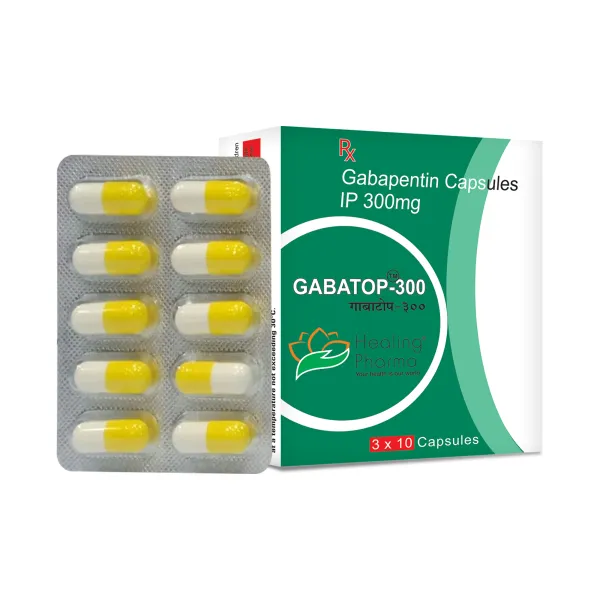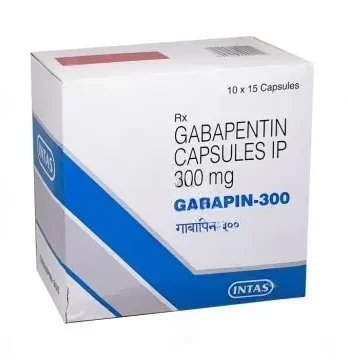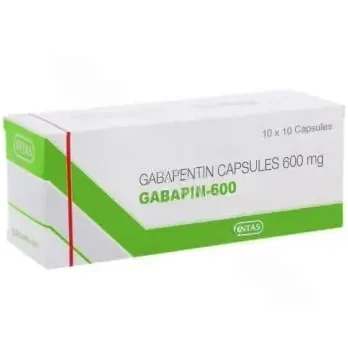Gabatop 300mg Capsule (Gabapentin)
Price range: $22.00 through $51.00
Description
Gabapentin is a widely prescribed medication primarily used for treating nerve-related conditions such as neuropathic pain, epilepsy, and sometimes off-label for anxiety or restless leg syndrome. One of the common brands available for gabapentin is Gabatop, and the Gabatop 300mg capsule is among the most frequently used dosages.
In this blog, we’ll explore everything you need to know about Gabatop 300mg capsules — how they work, their benefits, proper dosage, side effects, and important precautions.
What is Gabatop 300mg Capsule?
Gabatop 300mg is a prescription medication containing gabapentin as its active ingredient. Gabapentin belongs to a class of drugs called anticonvulsants or antiepileptic drugs. Although originally developed to treat epilepsy, gabapentin has been found effective for a variety of neurological disorders.
The 300mg capsule dosage offers a mid-range strength option, suitable for many patients either as an initial dose or part of a titration schedule.
How Does Gabatop Work?
Gabapentin works by affecting the way nerves send messages to the brain. Specifically, it interacts with calcium channels in nerve cells, which helps to reduce the abnormal excitement or pain signals. This modulation stabilizes nerve activity, thereby reducing seizures, neuropathic pain, and other nerve-related symptoms.
Unlike traditional painkillers, Gabatop doesn’t act on opioid receptors, making it less likely to cause dependency or abuse, but it still needs to be used under strict medical supervision.
Uses of Gabatop 300mg Capsule
- Epilepsy:
Gabatop 300mg is commonly prescribed as an adjunctive therapy to control partial seizures in epilepsy patients. It helps reduce the frequency and intensity of seizures. - Neuropathic Pain:
Neuropathic pain results from nerve damage due to conditions like diabetes (diabetic neuropathy), shingles (postherpetic neuralgia), or spinal cord injury. Gabatop helps relieve chronic nerve pain by calming nerve impulses. - Restless Leg Syndrome (RLS):
Doctors sometimes prescribe gabapentin for patients experiencing uncomfortable sensations and urges to move their legs, especially at night. - Off-label Uses:
Gabapentin may also be used for anxiety disorders, fibromyalgia, and migraine prevention, although these uses are less common and still under study.
Other Substitute medicines:
- Gabapin 100mg Tablet (Gabapentin)
- Gabapin 300mg Capsule (Gabapentin)
- Gabapin 400mg Capsule (Gabapentin)
- Gabapin 600mg Tablet (Gabapentin)
- Gabasign 800mg Tablet (Gabapentin)
- Gabasign 600mg Tablet (Gabapentin)
- Gabasign 400mg Capsule (Gabapentin)
- Gabasign 300mg Capsule (Gabapentin)
- Gabafresh 1000mg Tablet (Gabapentin)
- Gabatop 100mg Capsule (Gabapentin)
- Gabatop 300mg Capsule (Gabapentin)
- Gabatop 400mg Capsule (Gabapentin)
- Gabatop 600mg Tablet (Gabapentin)
- Gabatop 800mg Tablet (Gabapentin)
Benefits of Gabatop 300mg Capsule
- Effective Pain Relief: Many patients with chronic nerve pain report significant improvement.
- Seizure Control: Helps reduce seizures when combined with other antiepileptic drugs.
- Non-Addictive: Unlike opioids or benzodiazepines, gabapentin has low abuse potential.
- Flexible Dosing: The 300mg capsule provides a moderate dose that can be adjusted easily.
- Well-Tolerated: Most patients tolerate Gabatop well, with manageable side effects.
Dosage and Administration
Gabatop 300mg capsules are typically taken orally, with or without food. The exact dosage depends on the condition being treated, the patient’s age, kidney function, and response to therapy.
- Starting Dose: Often, doctors begin treatment with a lower dose (e.g., 300mg once daily) and gradually increase it to minimize side effects.
- Typical Dosage: For neuropathic pain or seizures, doses may range from 900mg to 3600mg per day, divided into 2-3 doses.
- Adjustments: Dosage may be adjusted based on therapeutic response and tolerance.
- Missed Dose: If a dose is missed, take it as soon as remembered unless it’s near the next dose. Do not double doses.
Side Effects of Gabatop 300mg Capsule
Like any medication, Gabatop may cause side effects. Common side effects include:
- Dizziness
- Drowsiness or fatigue
- Coordination problems or tremors
- Swelling of extremities (edema)
- Weight gain
- Blurred vision
- Dry mouth
More serious side effects are rare but include mood changes, suicidal thoughts, severe allergic reactions, or unusual bleeding.
Precautions and Warnings
- Medical History: Inform your doctor about any history of kidney disease, mental health disorders, or allergies.
- Pregnancy and Breastfeeding: Use only if clearly needed and prescribed by your healthcare provider.
- Driving and Operating Machinery: Gabatop may impair your ability to perform tasks requiring alertness.
- Avoid Alcohol: Alcohol can increase dizziness and sedation when combined with gabapentin.
- Kidney Function: Dosage adjustments may be necessary in patients with impaired kidney function.
- Drug Interactions: Inform your doctor about all medications you are taking to avoid interactions.
When to Contact Your Doctor
Seek immediate medical attention if you experience:
- Signs of an allergic reaction: rash, itching, swelling, severe dizziness, trouble breathing.
- Severe mood changes or suicidal thoughts.
- Unusual bleeding or bruising.
- Severe drowsiness or difficulty breathing.
Storage and Handling
- Store Gabatop capsules at room temperature away from moisture and heat.
- Keep out of reach of children.
- Do not use expired medication.
Conclusion
Gabatop 300mg capsules offer an effective treatment option for managing epilepsy, neuropathic pain, and other nerve-related conditions. When used responsibly and under medical supervision, Gabatop can significantly improve quality of life by controlling symptoms and reducing discomfort.
If you are prescribed Gabatop 300mg capsules, follow your healthcare provider’s instructions carefully and report any unusual symptoms promptly. Always consult your doctor before making any changes to your medication regimen.






Reviews
There are no reviews yet.